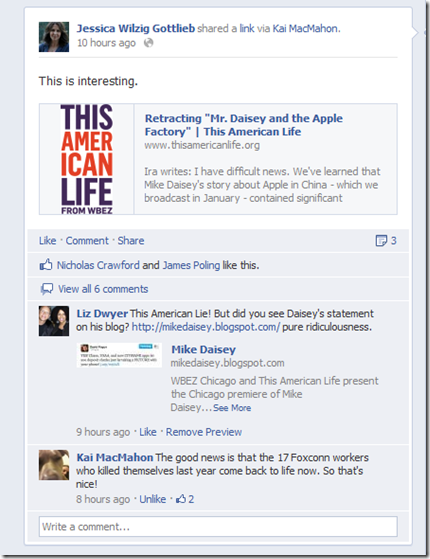This American Lie, #Kony2012 and the Problem With Messengers
There are many good journalists in America. There are talented documentarians too. Great journalists and biographers aren’t typically found in social media. Sure there are some, but not the majority.
This weekend This American Life will spend a full hour unwinding a previously aired story “Mr. Daisey and the Apple Factory”. In this episode Mike Daisey chronicles mistreatment of workers in factories that make components for Apple products. In a particularly ironic turn this episode became the most popular of all downloads in the iTunes store. A petition was started and national media picked up the story… I know… another petition. But this time Apple responded by hiring a third party to audit working conditions in the factories in China.
Something good happened. Maybe.
Concurrently a video went viral. It’s about a man named Joseph Kony. Kony is the head of the Lord’s Resistance Army (LRA) and has abused tens of thousands of children in Uganda turning them into sex slaves and killers. It is absolutely indisputable that Joseph Kony is evil personified. What is in dispute is whether or not this video is helpful for the people of Uganda. Further, Jason Russell, cofounder of Invisible Children (the non profit behind the video), has had some sort of emotional break. Among other things he was seen naked and agitated on a street corner midday. The police got involved and he is currently hospitalized on a 72 hour hold.
None of this makes Joseph Kony less evil. None of this makes children (many of whom are now adult) less harmed.
As Mike Daisey astutely points out there is a difference between entertainment and journalism. Sometimes we as consumers of content get confused, and this is where we can take some power back. We can use critical thinking to determine if we are consuming journalism, activism or storytelling. The days of passively reading a newspaper and trusting all sources are over.
We need to understand that activism isn’t balanced and doesn’t purport to be. The video that Invisible Children put out doesn’t have to be 100% factual it’s meant only to make us uncomfortable. It’s meant to provoke activism or at the very least slacktivism (sharing the video on your Facebook page and signing a virtual petition). The video isn’t meant to enlighten the people in Uganda nor is it meant to be a comprehensive documentary. It’s like a blog in that it’s meant to plant a seed, it never meant to be the tree.
Is it a bunch of rich white Southern California men trying to affect change in Africa? Yep, it sure is. Does that make their message less palatable? Yes, for some it rings of colonialism, narcissism and the great white savior. Others see it as white privilege and a fabulous use of the gifts bestowed upon men. I think I see it as both with the caveat that I assign no value good or bad.
Mike Daisey clearly saw human rights abuses in China. Does his embellished storytelling make Foxconn less culpable? Kai MacMahon wisely points out that 17 workers at Foxconn killed themselves last year. When This American Life apologizes for getting a story wrong do these people, these young humans, magically come back to life?

There’s a blurry line these days and sometimes it’s hard to tell if you’re looking at propaganda, storytelling, journalism or advertising. Sometimes you’re looking at all three. With fragmented media and the birth of online news the onus will be on the consumer for the foreseeable future.
Ask yourself if it matters that Mike Daisey embellishes a story. He isn’t a journalist, but he is reporting something to us that needs to be heard. If every word isn’t true we can’t dismiss the fact that our yearning for cheap electronics is paid for in both health and sanity by factory workers half a world away.
Does it matter that Joseph Kony’s reign of terror is winding down? Is it a story that still needs telling? Does the US need to be the world’s police force? Yes. Yes. I hope not. Was the video manipulative? Of course it was. Is manipulative a bad thing? Not always.
The problem we are seeing with social media and ridiculous amounts of transparency is that we are placing too much value on the messenger and not enough on the message. People can get an awful lot of stuff wrong and still be very right.